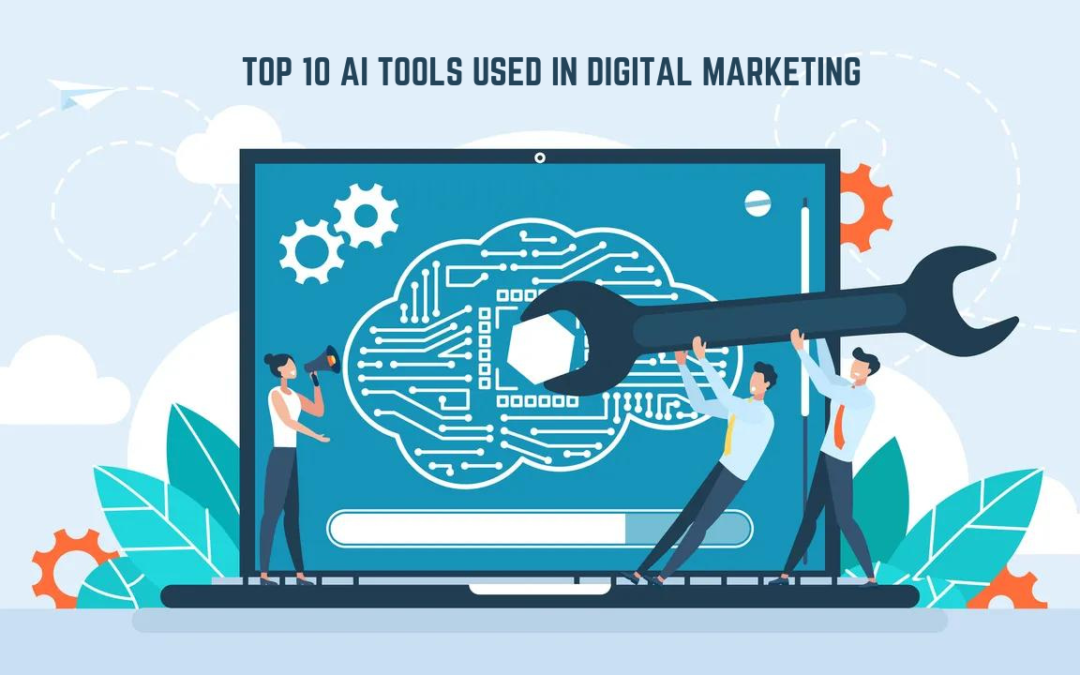Are you looking for the AI tools commonly used in digital marketing Then look no further than this blog.
An artificial intelligence (AI) tool is a software application that utilizes artificial intelligence and machine learning technology, which simplifies the day-to-day tasks that originally required more time and effort.
Here are the 10 popular AI tools used in digital marketing.
1.Surfer SEO
Surfer SEO is an on-page content optimizing tool that helps analyze the content of a web page and boost the visibility and organic traffic of the website. This AI tool is packed with other key features like a SERP analyzer, a content editor, keyword research, and an SEO audit, which makes this AI tool very effective.
website link : https://surferseo.com/
Pros:
- Surfer SEO gives thorough statistics and practical insights based on a review of top-ranking pages for a specific keyword. This includes keyword density, word count, the usage of headings, graphics, and other elements.
- This tool allows users to study the search engine results page (SERP) for certain keywor-ds, providing information about what top-ranking pages are doing well.
- Surfer SEO’s audit tool evaluates existing content against various on-page SEO factors and provides specific recommendations for improvement.
Cons:
- This tool allows users to study the search engine results page (SERP) for certain keywords, providing information about what top-ranking pages are doing well. Surfer SEO may be quite expensive, particularly for small enterprises or individual bloggers. The pricing plans may not be suitable for everyone.
- Because it’s a cloud-based tool, it needs a consistent internet connection to function properly. This can be a disadvantage in locations with limited connectivity.
- This tool allows users to study the search engine results page (SERP) for certain keywords, providing information about what top-ranking pages are doing well.
2. Seventh sense
The seventh sense is an email deliverability tool. It is mainly useful for email marketers who used to handle bulk email in their work. This AI tool customizes the email for every individual user from a particular target audience group.
Pros:
- Seventh Sense employs AI to find the optimal times to send emails to each recipient, increasing interaction while decreasing the possibility of emails being ignored or deleted.
- The technology tracks recipients’ activity over time, learning their habits and preferences in order to continuously enhance email effectiveness.
- Provides detailed analytics and reports that help marketers understand the performance of their campaigns and make informed decisions.
Cons:
- Seventh Sense can be pricey, especially for small enterprises or those on a tight budget. For many larger firms, the value often justifies the cost.
- Advanced capabilities and analytics may be intimidating to those who are unfamiliar with email marketing metrics and tactics.
- The tool’s usefulness is contingent on having enough previous data on recipient behavior. For fresh email lists or campaigns, it may take some time to collect enough data to notice substantial results.
3. Hootsuite
Hootsuite is a social media management platform that helps to handle multiple social media handles in one place. The main purpose of this AI tool is to post-schedule and analyze the activity of a particular social media account.
Pros:
- Hootsuite offers sophisticated analytics and reports that enable customers to track the efficacy of their social media initiatives, understand audience engagement, and calculate ROI.
- The software facilitates team collaboration by allowing many users to manage accounts, assign tasks, and collaborate on social media strategies.
- The software facilitates team collaboration by allowing many users to manage accounts, assign tasks, and collaborate on social media strategies.
Cons:
- The most extensive and valuable analytics reports are only available on higher-tier plans, which limits the insights available to users on lower-tier plans.
- Some users notice limits on the quantity of posts or types of content that can be planned on specific social media networks, particularly due to Instagram’s API restrictions.
- Regular platform updates and modifications can disrupt operations and force users to adjust to new interfaces or functions.
4. Jasper ai
Jasper is an SEO-friendly content writing tool powered by artificial intelligence. This AI tool can create content in more than 28 languages. Jasper AI optimizes the content and recommends suitable keywords according to the user’s preferences. asper is an SEO-friendly content writing tool powered by artificial intelligence. This AI tool can create content in more than 28 languages.
Pros:
- Jasper AI excels at creating cohesive, relevant, and high-quality material in a variety of formats. It can assist with blog posts, articles, social media updates, ad text, and more.
- Jasper AI has a wide range of uses, including SEO content, email marketing, product descriptions, and even creative writing.
- Jasper AI contains capabilities that aid in content optimization for search engines, such as keyword integration and meta description suggestions.
Cons:
- Jasper AI can be quite expensive, particularly for small enterprises or individual consumers. The subscription rates may be prohibitive for people on a restricted budget.
- Overreliance on AI-generated material may limit innovation and uniqueness. Users should mix AI aid with their own distinct voice and thoughts.
- The use of AI for content generation poses ethical concerns about authorship, originality, and the possibility of misuse in producing misleading or low-quality information.
5. Grammarly
Grammarly is a digital grammar checker tool that finds and corrects grammatical errors, punctuation, and spelling mistakes in content writing. This tool is available as a web application and a web extension.
Pros:
- Grammarly provides thorough corrections for grammar, spelling, punctuation, and syntax issues, allowing users to write error-free prose.
- Grammarly advises techniques to make writing clearer and more concise, so increasing readability and effectiveness.
- The interface is intuitive and simple to use, making it accessible to people with varied degrees of technical knowledge.
Cons:
- While Grammarly has a free version, the premium version, which includes additional capabilities, is very pricey, which may be prohibitive for certain users.
- Grammarly may not always understand the context, leading to incorrect suggestions, particularly with complex or nuanced text.
- The tool may recommend changes that make the text too formal or lose the writer’s original voice and style.
6. Canva
Canva is a graphic design tool where one can create posters, logos for webpages, and social media posts. This AI tool offers most of its features in a free version. Since it is user-friendly, even a person with no prior design knowledge can use this tool to create their own design.
Pros:
- Canva provides a large library of templates for a variety of uses, including social media graphics, presentations, posters, and business cards. This allows users to generate professional-looking designs rapidly.
- Users can easily alter templates with their own images, text, colors, and fonts, resulting in personalized and unique designs.
- Canva is web-based, which means it can be viewed from any device with an Internet connection. It also offers mobile apps for designing on the fly.
Cons:
- Canva is fantastic for basic and intermediate design needs, but it lacks some of the sophisticated features and capabilities found in professional design software such as Adobe Photoshop or Illustrator.
- While Canva provides many free templates and materials, some of the best features and tools are only available to Pro users, potentially limiting the quality of designs for free users.
- Users may experience slow performance or glitches, especially with complex designs or when using the platform during peak times.
7. Copy.ai
Copy AI is an advanced AI tool that is specifically used for copywriting. Copy AI works on the framework of OpenAI’s chat GPT 3.5 and 4. This tool produces engaging copy content by analyzing the input data and filtering out irrelevant content.
Pros:
- Copy.ai significantly speeds up the content creation process by generating high-quality text quickly, allowing users to focus on other tasks.
- Copy.ai features an intuitive, user-friendly interface that makes it accessible even for those with minimal technical skills.
- By providing various content suggestions and ideas, Copy.ai can help spark creativity and overcome writer’s block.
Cons:
- Copy.ai significantly speeds up the content creation process by generating high-quality text quickly, allowing users to focus on other tasks.
- The tool supports a wide range of writing tasks, including product descriptions, email marketing, social media posts, blog ideas, ad copy, and more.
- By providing various content suggestions and ideas, Copy.ai can help spark creativity and overcome writer’s block.
8.Brand 24
Brand 24 is an advanced social media monitoring tool. It was used to identify and analyze the brand’s activity online. This AI tool helps track market campaigns, competitors, and customer feedback.
Pros:
- Brand24 tracks mentions of your brand, products, or keywords across various online platforms, including social media, blogs, forums, news sites, and more.
- The tool provides real-time notifications whenever your brand is mentioned, enabling quick responses to both positive and negative feedback.
- Brand24 offers sentiment analysis to gauge the tone of the mentions, helping you understand how people feel about your brand.
Cons:
- While Brand24 offers various pricing plans, it can be expensive for small businesses or individual users, especially for more advanced features and higher data limits.
- The extensive data provided can be overwhelming, and users may need to spend time filtering and interpreting the information to extract valuable insights.
- Compared to some competitors, Brand24 may offer fewer integration options with other tools and platforms, which could limit its usability within certain workflows.
9. Market muse
Market Muse is a content marketing and keyword planning tool. It is specifically used for planning blog topics and optimizing the content for SEO. Market Muse has a dedicated data visualization feature that helps highlight important parts of the content.
Pros:
- MarketMuse uses AI to analyze content and provide recommendations for improving relevance and comprehensiveness, helping to enhance SEO performance.
- The tool assists in developing a data-driven content strategy by identifying content gaps, suggesting new topics, and prioritizing content creation efforts based on potential impact.
- MarketMuse compares existing content to competitors and offers recommendations for how to enhance it, such as keyword usage, content depth, and topic coverage.
Cons:
- MarketMuse is relatively expensive, and the cost may be prohibitive for small enterprises, startups, or individual content creators.
- Despite its user-friendly design, the depth and breadth of features can be overwhelming for users who are not familiar with content optimization and SEO strategies.
- The efficiency of MarketMuse is mainly dependent on statistics. For new websites with little current content or traffic, the advice may be less effective.
10.Predis. ai
The Predis.AI tool is used to generate content for the social media posts. This tool has an automated publishing option, so posts can be scheduled as per the user’s preference across multiple social media platforms.
Pros:
- Predis.ai employs AI to generate engaging social media posts, allowing users to save time and stick to a consistent publishing schedule.
- The application enables users to analyze competitors’ social media performance, providing insights into what works effectively in their business and identifying areas for development.
- Predis.ai offers content suggestions and ideas based on trends, audience interests, and past performance, aiding in content planning and strategy.
Cons:
- Predis.ai can be relatively expensive, especially for small businesses or individual users. The pricing might be a barrier for those with limited budgets.
- AI-generated content may lack the creativity and nuance that human writers bring, potentially leading to generic or uninspired posts.
- Despite its user-friendly interface, new users might need some time to learn how to utilize all the features and make the most of the platform.
This article is contributed by the team.

